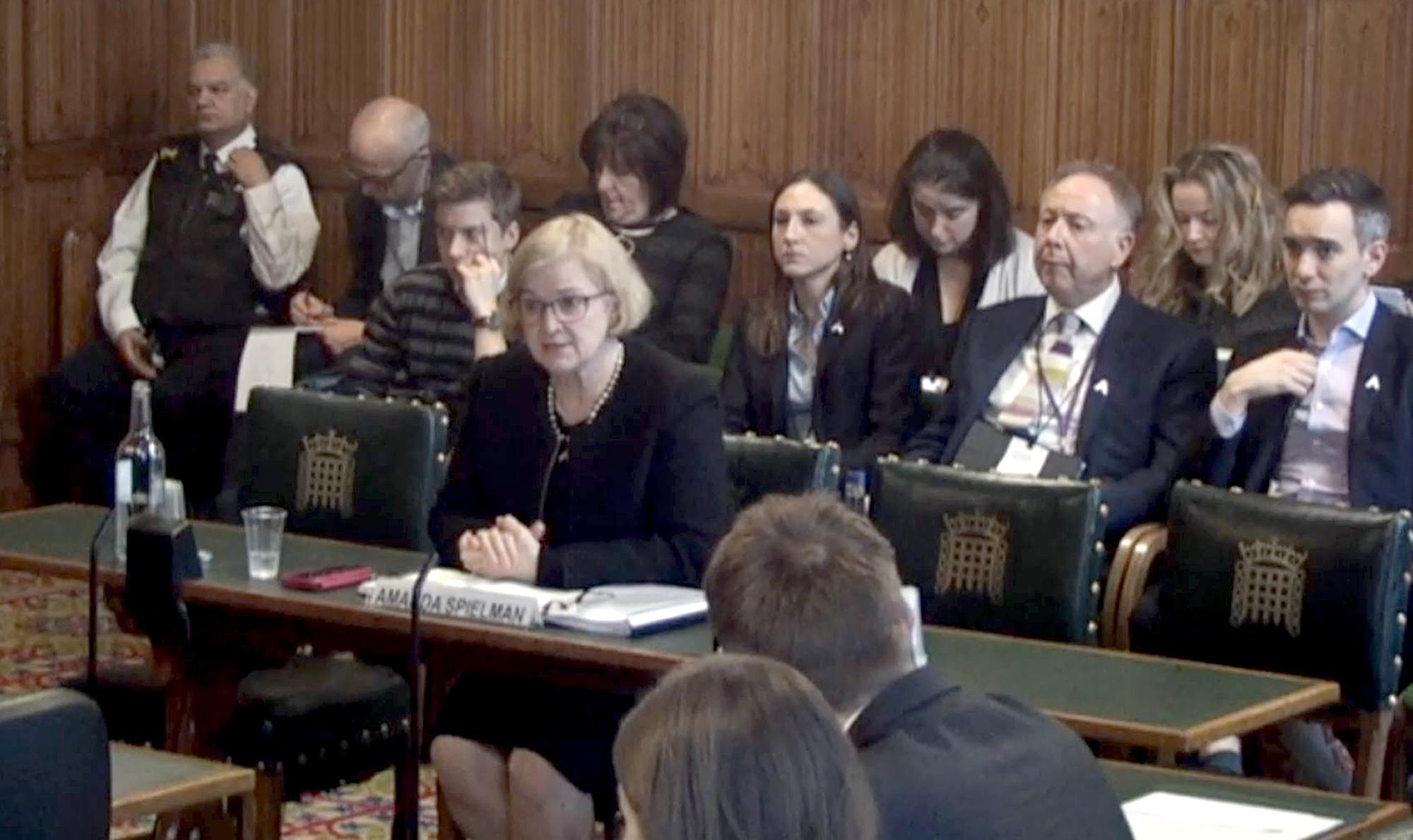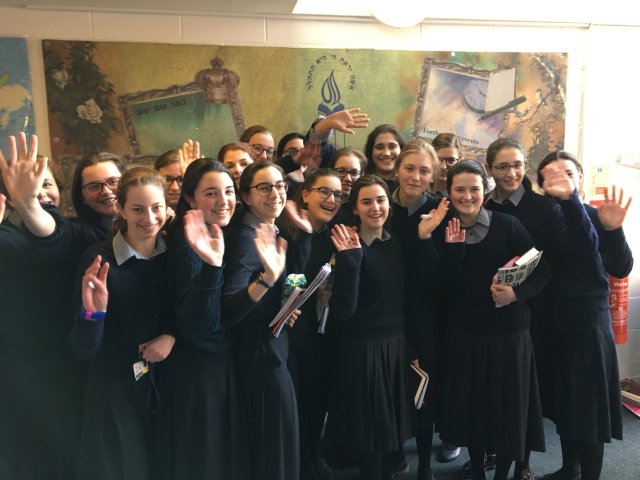Pupils at the Yesoday Hatorah Senior Girls School in Stamford Hill

Towards the end of the 18th century, though, and in response to the values of the Enlightenment, some Jews began to argue for a greater openness to the world (the Haskalah movement). Others, however, regarded the Enlightenment as yet another potential existential threat and re-doubled their commitment to distinctiveness and separation. This group – in reality a collection of distinct groups, from different countries – are now known as Haredi Jews, though they are sometimes described as ultra-orthodox, a description the Haredim don’t particularly like.
These Jews were almost completely wiped out by the Holocaust. But in the latter half of the 20th century, there has been a revival and a renewed determination to survive. And now the Haredi way of life is enjoying something of a revival. Converts from more secular Jewry have started to join, with many being attracted to the emphasis on family life and modesty of dress and manners.
The UK has the largest collection of Haredi Jews in Europe – in Gateshead, Manchester and Stamford Hill in London. And within 20 years, they will make up the majority of Jews in this country. In Stamford Hill, there are 90 synagogues within a few square miles, catering for about 6,000 families. Their average family size is eight.
On Monday, I visited the Yesoday Hatorah Senior Girls School in Stamford Hill, where staff and pupils were preparing for the end of term and the coming Passover holidays. Their light, open and modern building was opened by Tony Blair in 2005 when the school became voluntary aided. A number of voices in their community warned against any accommodation with the state, that this association would compromise their desire to maintain their distinctiveness. But nonetheless, the school established an excellent reputation.
And it is little surprise why. As I wandered around the corridors, the atmosphere was quiet and studious, calm even. None of the girl’s school lockers was locked, despite containing their valuables. Stealing is unheard of here. Even the local Sainsbury’s waives the usual two at a time rule for schoolchildren when it comes to Yesoday Hatorah girls. The girls know to stand respectfully as visitors enter the room, and they listen to their teachers. A few years after opening the new building, the school was the top of the Department of Education’s league table for value-added student progress.
But this is a Haredi school serving the Haredi community and seeking to reflect Haredi values. And Haredi values are different from mainstream secular values, not least when it comes to sex education. Modesty is an important virtue for the Haredim and that is reflected in their dress – no trousers for women, white shirts and black coats for the men – and also in their desire to protect their children from what they see as early sexualisation. And that means, for example, that the school redacts GCSE textbooks so that references to sex are not shown. It was one of these textbooks that got picked up by the secular campaigning organisation Humanists UK, who then complained to Ofsted.
“Jewish school removed ‘homosexual’ mentions from GCSE texbook” was the Guardian headline, which was a bit naughty of them, given that the redaction was to all references to sex and sexuality and not just to homosexuality. But it was publicity like that that prompted Ofsted to make a snap inspection of the school earlier this month, an inspection that has gone down extremely badly within the local Haredi community, and prompted the school’s Principal, Rabbi Avroham Pinter, to write a furious letter to Teresa May complaining that Ofsted has become the government arm of secular intolerance:
“It is hugely disappointing that a fringe pressure group can influence so-called independent bodies in this way. Our community has been targeted consistently and our staff and students are being intimidated by the deliberate disregard for cultural sensitivities.”
At break time, I talked to some of the pupils. And what they told me bore this out. The Ofsted inspectors obviously came with a fixed agenda, they wanted to talk to the girls about sex. And those who told me about it were obviously made to feel extremely uncomfortable by the questions. Three girls complained to the Principal and he told them to explain that to the inspectors. They did – but that only made matters worse, and invited further interrogation. They were very upset by the whole process. “This felt like an attack,” one of them said, “because under no circumstances did we want to discuss things that we were brought up our entire lives not to discuss.”
And their parents were furious. “Our daughters came home severely shaken after a day of inspection where inspectors have attempted to force alien concepts onto our children” one parent wrote. “an alien discussion with our girls of their private bodies and of intimate relationships with strangers … serves to undermine our beliefs in every possible way.”
The reactions of the staff were little different. They all agreed that the inspectors were wholly uninterested in the quality of teaching – it was the Jewish values bit they had come to inspect. One inspector peered at the mezuzah on her door. “What’s this?” she questioned. In Deuteronomy, God tells us to write his words on our gates and doorposts, the teacher explained. The Ofsted inspector scribbled extensive notes on her clipboard. “This feels like the KGB” one teacher quipped, semi-seriously. Someone else whispered the word “Gestapo”.
Yes, a bit over the top perhaps. But make no mistake: the fear is real and visceral.
For what we mean by ‘British values’ is at stake here, and whether such values are generous enough to include groups such as the Haredim. In November 2014, the Department of Education published guidance on promoting so-called British values in schools as a part of their anti-terrorism Prevent agenda. All schools have a duty to “actively promote the fundamental British values of democracy, the rule of law, individual liberty and mutual respect and tolerance of those with different faiths and beliefs”. It is a huge irony that under the rubric of respect and tolerance for those with different beliefs Ofsted is going after religious schools such as Yesoday Hatorah.

The head of Ofsted, Amanda Spielman, when speaking to the Educational Select Committee this month, was questioned on this very point. After discussing the worry that some schools might be a conveyor belt to terrorism, the subject of diversity came up.
“I have a number of orthodox Jewish schools in my constituency, isn’t a British value also valuing diversity?’ asked Ian Mearns, the Labour MP for Gateshead. Spielman replied:
“This is precisely the dilemma of liberalism that’s been discussed… At what point does a group accommodating intolerance undermine tolerance itself? There is a particular difficulty for orthodox Jewish schools and we meet and talk to many faith groups across all faiths.”
This sounds like dangerous mission creep. The idea that the peaceable, keep themselves to themselves Haredi Jewish community are a group “accommodating intolerance” and that thereby they “undermine tolerance itself” is an absolute travesty of the truth. Indeed, the very point about tolerance is that we accept a variety of different viewpoints on life, including those to which we do not ourselves subscribe. And that is precisely the ideological generosity that Ofsted is not affording to the much-abused Haredim. And Ofsted should be thoroughly ashamed of themselves.
The very existence of the Haredim began as a reaction against liberal and Enlightenment values. Traditionalism was their survival mechanism. So it makes little sense to expect them to subscribe to liberal and enlightenment values now. The question is whether our democracy is capacious enough to welcome them. And I very much hope that it is.
But some in the Haredi community are beginning to doubt this. “Our worry is of history repeating itself,” wrote one parent, after the inspection. Some fears run very deep. “We are an established, small, law-abiding community who contribute hugely to our society, but are being hounded out by those acting in the name of your government” was Rabbi Pinter’s distraught cry to the Prime Minister.
This issue is not just about the Haredim. Ofsted has it in for Muslim schools in much the same way. Indeed, armed with so-called “British values” they are gaining a reputation to have it for all schools of a religious character. And the secularists are delighted that Ofsted is now doing their bidding. “She refuses to be silenced by the bullies, and has pressed on with intervening in schools where religion threatens the education and wellbeing of children,” gushed the National Secular Society website about Amanda Spielman.
Except the Haredim are not out to bully anyone. From what I saw at Yesodet Hatorah, it is Speilman and Ofsted who are behaving like the school bully. For it is Ofsted that has failed to understand the most basic feature of their own values: respect and toleration. Indeed, if British values cannot accommodate a peaceful and law abiding group like the Haredim then these values are little to be proud of.










Join the discussion
Join like minded readers that support our journalism by becoming a paid subscriber
To join the discussion in the comments, become a paid subscriber.
Join like minded readers that support our journalism, read unlimited articles and enjoy other subscriber-only benefits.
Subscribe